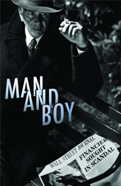Theatrical ‘Amnesiac’ Maria Aitken on Bringing Man and Boy to Broadway With Frank Langella
About the author:
If director Maria Aitken looks more familiar than many in her behind-the-scenes role, there's a very good reason. Aitken has played leading roles at the Royal Shakespeare Company, the Royal National Theatre and the Old Vic, and has starred in more Noel Coward plays on the West End than any other actress. Aitken made a splash on American stages with her Broadway directorial debut, the hit Hitchcock-ian farce The 39 Steps, and now she’s back on this side of the pond with Terence Rattigan’s Man and Boy, again at Roundabout Theatre Company. Below, Aitken shares her experience of mining this flawed, fascinating play and working with leading actor Frank Langella as a corrupt financier at odds with his son.
![]()
When I read a play I know right away if I can do it or not, and if I don’t begin to see or smell something quite quickly it probably isn’t for me. About 10 years ago, I was scouting around the shelves of the London library to see if someone had forgotten a play, and I saw Man and Boy. I knew Terence Rattigan’s work fairly well and I was surprised that I’d never heard of it. I was astonished, because I found it still very shocking, and it’s unusual for a period play to retain its shock. What was interesting about it was that I thought, “I can’t do this, I don’t want to do this,” but it haunted me. One can’t pretend it’s a perfect play, but it’s a fascinating play.
Plays like The Winslow Boy and The Deep Blue Sea are remarkable pieces of work, and Rattigan was an absolute golden boy of the West End for a very long time, like Noel Coward. Man and Boy was a departure for him, which for me makes it the most interesting. It was a very dangerous play for him to write. He was gay and, of course, closeted because it was illegal in those days. His plays often had a sort of gay sensibility running underneath, but he changed genders in them, so Man and Boy is the closest he ever got to exploring his own world. It was a great leap for him, and I think he felt he was mining a part of himself he’d kept concealed.
I don’t like to say what the fulcrum of the play is because I don’t want to spoil it for anyone! I do think it’s still very potent, and of course there is a financial aspect that is very apropos for now—arteriosclerosis of the capitalist system, as it were.
Suffice it to say, it was not a success in its first and only previous productions in London and New York in the 1960s, with Charles Boyer in the lead. Audiences today are much more sophisticated about most of the things that it mentions, but I’ve no idea whether it was originally sunk by the content; after all, the '60s was a very free-thinking decade. I think it was probably the fact that Boyer was a bit too cozy. You need that hint of menace, that toughness. This person is amoral.
Rattigan wrote the lead part of financier Gregor Antonescu for Rex Harrison, who got thoroughly confused about it and thought he was playing someone gay, which of course Gregor is not. Rattigan was furious about it, but Boyer saw it lying around during a party at Rattigan’s house and asked to read it, and then offered himself for the lead. In the end, Rattigan said he played it like a head waiter.
Working with Frank Langella has been a fascinating collaboration, because playing Gregor takes a very particular kind of actor. What’s so interesting is that American stars don’t like playing villains, which is why the Brits always play them in the movies. But Frank is a real man of the theater and he knows perfectly well that a charming villain is one of the best roles you could have, so he was mad for it from the moment he read it. It requires somebody who has access to some darkness—as he showed so wonderfully with his Nixon—but also with impeccable charm and comic timing.
It’s true that Man and Boy couldn’t be more different than my last Broadway show, The 39 Steps, but that play was an aberration for me. It would be an aberration for anyone, because there’s nothing quite like it. I do a lot of comedy, but The 39 Steps was an homage to theater with only four actors; arranging it was like a crossword puzzle, because it was so snappy and fast and parodic. I wasn’t sure The 39 Steps would go very well here, and I have no idea how American audiences will take to Man and Boy, because the audiences are very different in each country.
In London, I did the show with David Suchet, a wonderful stage actor, but he and Frank are very different so it’s almost as if I’ve never done it before. Not only do I now have an American designer and composer, I’m also a complete amnesiac about any production I’ve done. I found it very difficult doing The 39 Steps over and over again because I kept changing it. It doesn’t interest me to remount something, and I don’t keep the sort of records that would enable me to. I honestly never can reconstitute a production. All you can do it follow your own taste—and hope that it coincides with other people’s tastes.

